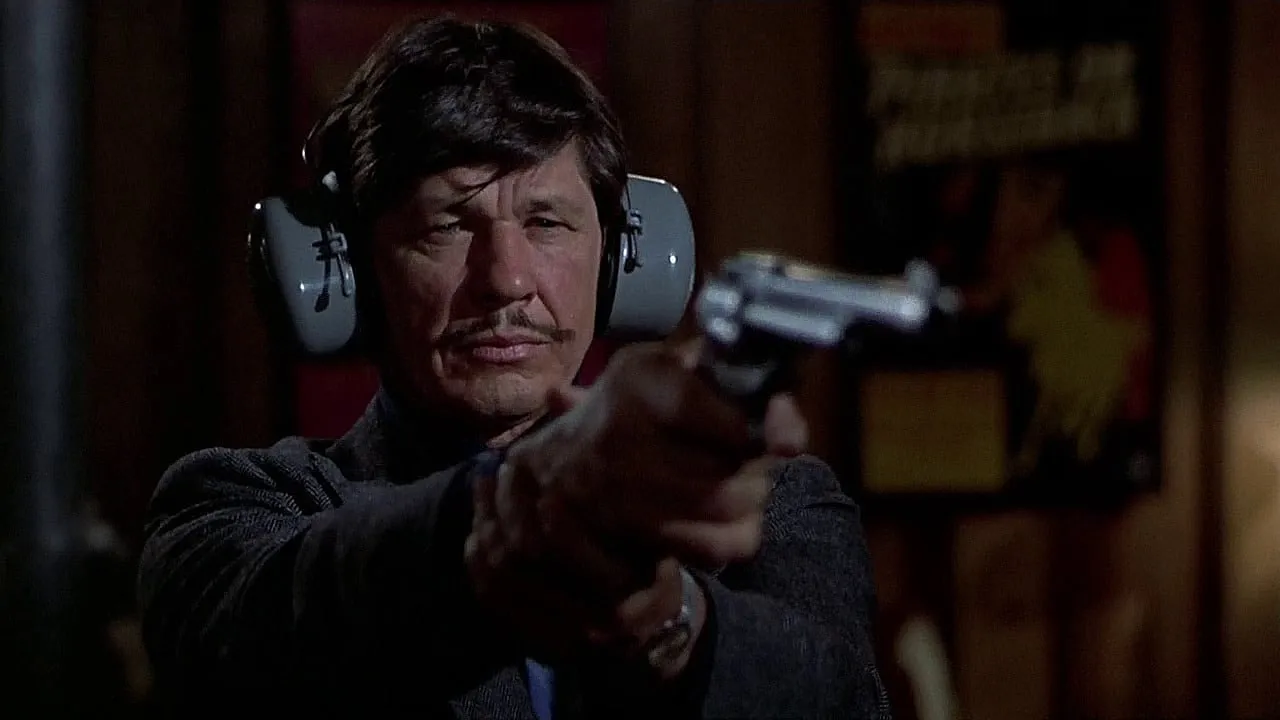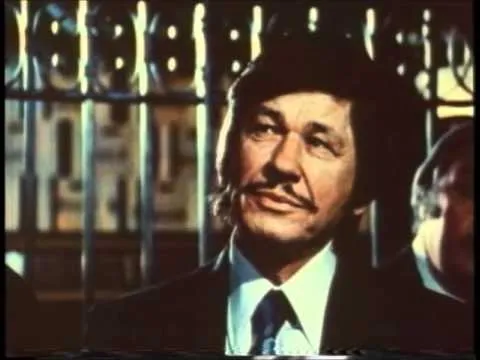
Bravery is something which is in short supply in today’s Hollywood, although it is sorely needed. It was needed even in 1970s, in much more open-minded and permissive age, when big studios used to try new things and break all kinds of taboos. Some lines even then were more difficult to cross than others, and one such example was adaptation of Brian Garfield’s novel that would ultimately become Death Wish, 1974 crime thriller directed by Michael Winner. Made only after many studios, actors or directors washed their hands of it, it turned out to be one of the most controversial films of its time, but also popular enough to turn Charles Bronson into major star and spawn series that would always be associated with that actor.
In the film Bronson plays Paul Kersey, mild-mannered and relatively affluent New York architect who, like many members of upper middle class, adopted liberal world view and considers rampant street crime in the city to be product of economic inequality best solved through welfare instead of policing. Kersey considers himself a man of peace and he lived by those principle during Korean War, serving in US Army as conscientious objector. Everything changes when group of street thugs invades his apartment, murders his wife Joanna (played by Hope Lange) and rapes his daughter Carol (played by Kathleen Tolan) in a way that would leave her catatonic. Kersey is devastated by the news and later gets additionally frustrated with police’s apparent inability to brings perpetrators to justice. His firm sends him to Tuscon, Arizona to oversee important building project and there he befriends the client, local businessman and gun enthusiast Ames Jainchill (played by Stuart Margolin) who would give him a revolver as symbolic appreciation for his service. One night Kersey, armed with said revolver, goes out on the street in an attempt to lure street muggers and deliver his own brand of vigilante justice. This expedition results with a death of one mugger and when such incidents repeat, New York police Lieutenant Ochoa (played by Vincent Gardenia) starts investigating. This task gets increasingly difficult because the New York public, sick and tired of street crime, considers mysterious night vigilante to be hero.
Just like Dirty Harry three years earlier, this film was viciously attacked by critics (most of them having same liberal or left-of-centre views like Kersey in the beginning) for alleged promotion of fascism and/or violence as the simplest and most effective solution of complex social problems. In case of Death Wish, such criticism seemed even more justified because the protagonist, unlike Dirty Harry, isn’t policeman with legal authority to carry and use gun, but actually an ordinary citizen who takes law into his hands and even goes to randomly clean the city of “undesirables”. Such protagonist, however, looked as someone sorely needed for large segments of 1970s audience, at least those living in big cities faced with explosion of crime and violence police and courts weren’t able or willing to stop. Death Wish offered alternative in the form of ordinary citizen who struck back and gave street thugs at least some of their own medicine. The film thus became extremely popular and Paul Kersey later turned into most iconic role in Charles Bronson’s career.
While many accepted critics’ complaints against the film, including Brian Garfield, who had tried to distance himself from it as much as possible, Death Wish is far from simplistic and one-sided celebration of vigilantism. Script by Wendell Mays is actually much more nuanced and offers audience different interpretations and different ways to judge protagonist and his actions. Paul Kersey doesn’t start as bloodthirsty vigilante; the path to that point is very gradual and, actually, quite realistic. It takes time for Kersey to change from self-righteous urban liberal into street avenger and even after the start of his nighttime crusade, part of his old self is visible in brief moments of self-doubt or very human and believable reactions to his first kill. The script very intelligently hints that Kersey’s actions might be motivated both by revenge against the street scum and, as the title suggests, simply cope with unbearable loss of family by seeking violent death himself. Mays’ script also takes very realistic approach and the trio of thugs who destroyed Kersey’s family (with Jeff Goldblum playing their leader in his first film role) disappears from film never to be heard again and, presumably, remains unpunished form their crime. Script also add further dose of realism by portraying how would public and authorities react to vigilante roaming the city streets. This allows for interesting twist near the end, when Lieutenant Ochoa, who is portrayed as capable, intelligent and methodical detective, shares his superiors’ notion that actually following the law in case of Paul Kersey would bring more harm than good.
Whether you believe that Death Wish promotes vigilantism or not, it is still a very good film. Michael Winner, British director and Bronson’s close friend, keeps quick pace without sacrificing plot or characterisation. His direction is especially effective in action scenes, when violence happens quickly and realistically, without cheap one-liners or melodrama. Even the graphic and disturbing rape scene in the beginning is directed in a way that doesn’t look too exploitative. There are some minor problems with script, especially with the scenes showing psychological descent of Kersey’s daughter and somewhat underwritten character of Kersey’s son in law (played by Steve Keats). Herbie Hancock’s soundtrack, on the other hand, isn’t particularly attractive but, in a way, it goes hand in hand with images of run-down, dirty, graffiti-plagued streets of 1970s New York.
The biggest flaw of the film is, somewhat ironically, its star. Although, it’s not his fault. By the time of Death Wish, Bronson has already built the reputation on the roles of characters an average mugger wouldn’t want to meet in dark alley. So, simply by having Bronson in the role made many such encounters predictable. The film would have worked much better if Kersey was, as originally planned by producers, played by Jack Lemmon, an actor with much better acting range and more able to play mild-mannered liberal who gradually turns into bloodthirsty vigilante. However, Bronson does an adequate job and Death Wish works, providing ugly, disturbing but effective and often thought-provoking vigilante story which would serve as template for many similar films usually made with much less quality.
RATING: 7/10 (++)
Blog in Croatian https://draxblog.com
Blog in English https://draxreview.wordpress.com/
Leofinance blog @drax.leo
Cent profile https://beta.cent.co/@drax
Minds profile https://www.minds.com/drax_rp_nc
Uptrennd profile https://www.uptrennd.com/user/MTYzNA
Unstoppable Domains: https://unstoppabledomains.com/?ref=3fc23fc42c1b417
Hiveonboard: https://hiveonboard.com?ref=drax
Rising Star game: https://www.risingstargame.com?referrer=drax
1Inch: https://1inch.exchange/#/r/0x83823d8CCB74F828148258BB4457642124b1328e
BTC donations: 1EWxiMiP6iiG9rger3NuUSd6HByaxQWafG
ETH donations: 0xB305F144323b99e6f8b1d66f5D7DE78B498C32A7
Movie URL: https://www.themoviedb.org/movie/13939-death-wish
Critic: AA

